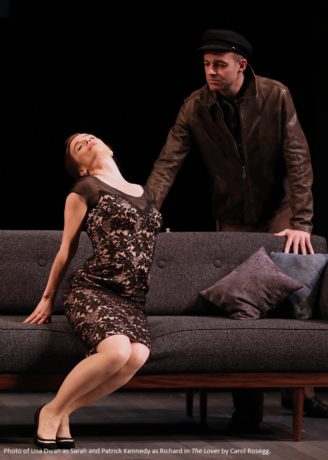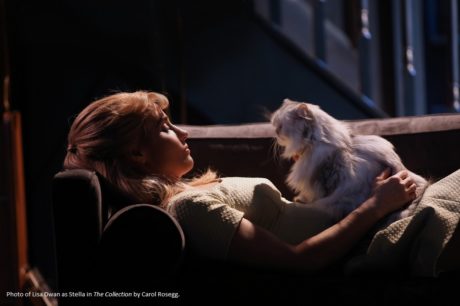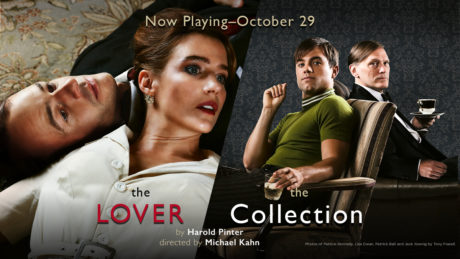The great Irish actor Lisa Dwan is in town doing something with the playwright Harold Pinter right now at the Lansburgh Theatre that is utterly amazing. She is both doing Pinter and undoing Pinter. Playing the sole female character in two Pinter one-acts directed by Michael Kahn, The Lover and The Collection, Dwan is giving a must-see performance that is nothing short of a one-woman decoding of what’s problematic about Pinter’s women.

In The Lover (written in 1962), Dwan plays Sarah, who is married to Richard (Patrick Kennedy), who gets off on imagining his wife is his whore. That’s the nub of the story: a sex game of let’s pretend, in which Sarah’s a horny whore and Richard’s a lusty punter. They have a conventional middle-class marriage; they have a sixties-tasteful home; he commutes every day to his office job. We never know what Sarah does all day besides bide her time with ants-in-her-pants anticipation till he returns. Which by prior arrangement Richard does, mid-afternoon (surprise surprise), in the guise of her titular lover for a romp with his fantasy strumpet.
The script is explicit about Pinter’s conceit that Sarah is into the game as much as Richard. She apparently, in fact, has little else on her mind.
Sarah is one of the first of Pinter’s female characters to function as motivation and justification for his male characters’ obsession with women as whores. As written Sarah is quick-witted, evenly matched with Richard as a verbal combatant. Pinter’s signature linguistic parrying and thrusting has a transfixing rhythm of menace and twisted eros, and Dwan and Kennedy nail it. But the text gives little evidence of Sarah’s self-knowledge or inner life. Instead, we find that out from Dwan’s performance when Sarah is alone onstage with no lines.

Watch whenever she sits, on a chair or sofa, deliberately and unspontaneously, first placing her hand in her lap as if to fold herself in half. Then watch when she’s on the sofa as she adjusts and positions her body, just so, as if to accommodate but really to parody the impending male gaze. Watch as she then reclines and lounges, just so, as if to feign an unnatural pose with no pretense of authenticity. This she does several times alone on stage such that when she does it again in Richard’s presence, we recognize immediately what’s both ludicrous and contrived in Sarah’s demeanor—which of course is not at all what Richard reads. He sees only the whore he wants to see. But she has shown us his delusion. Dwan literally anatomizes the fiction in Pinter’s sexist fixation before our eyes.
In the second one-act, The Collection (1961), Dwan plays Stella, who is married to James (Patrick Kennedy), who suspects his wife had sex with a gay man and is lying about it. That’s the nub of the story: a jealous husband whose conviction that women are faithless liars has converged with his homoerotic fantasy of sharing the same vagina with another man.
Unpacking Pinter can turn up some queer stuff.
Most of the action involves James’s confronting the young gay fashion designer in question, Bill (Patrick Ball), who lives with an older art collector, Harry (Jack Koenig), then confronting Stella, then confronting Bill again, then confronting Stella again. James is really driven to find out the truth (which in Pinter is a fool’s game); the story unspools with winning momentum; the male actors keep the comic tension tight.

But watch as Dwan lies languidly on a sofa downstage right with nearly no lines and a cat on her lap. Watch as her body language conveys blasé condescension as if to say: this is not about me, guys, it’s about you; go work out your hangups and let me know when you’re done. Literally repudiating the sexist projections in what is essentially one of Pinter’s early cockfight-and-pissing-match dramas, Dawn simply shows us Stella’s nonplussed choice to keep her own company with a cat.
Pinter is renowned for his pauses. Wordless moments meant to speak volumes. Little did he know how shrewdly and subversively Lisa Dwan would fill them.
Running Time: Two hours 5 minutes, including one intermission.
The Lover and The Collection play through October 29, 2017, at Shakespeare Theatre Company’s Lansburgh Theatre – 450 7th Street, NW, in Washington, DC. For tickets, call the Shakespeare Theatre Company Box Office at (202) 547-1122, or purchase them online.
LINK:
Review: ‘The Lover’ and ‘The Collection’ at Shakespeare Theatre Company by





